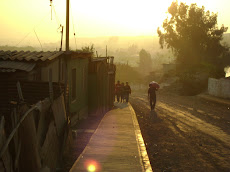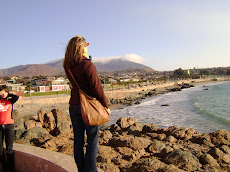Shouting counts to the cheerleaders, and struggling to remember the Spanish way to say"bend your knees" or practicing break dancing “trucos” (tricks) on the grass beside the river on a lazy  Saturday with some older boys I introduced myself to before boldly asking for some lessons. Then I am making a fool of myself in class, stumbling over Spanish verbs, having my students aid me in writing all the 18 conjugations of one verb on the board. Then I’m sitting at the simple kitchen table with Dorita and abuelita sipping Milo and watching “Hijos del Monte,” oohing and ahhing in horror, surprise, excitement. I remember what it felt like coming home on the days where it felt like I had been beaten, abused, taken advantage of and unappreciated and then I remember the two times walking home and seeing the words painted on the hill above the house that read, “Vallenar Puro Corazon (with a drawing of a heart in place of the word),” and being shocked by the steady stream of tears that spilled down my cheeks when I realized I would eventually leave.
Saturday with some older boys I introduced myself to before boldly asking for some lessons. Then I am making a fool of myself in class, stumbling over Spanish verbs, having my students aid me in writing all the 18 conjugations of one verb on the board. Then I’m sitting at the simple kitchen table with Dorita and abuelita sipping Milo and watching “Hijos del Monte,” oohing and ahhing in horror, surprise, excitement. I remember what it felt like coming home on the days where it felt like I had been beaten, abused, taken advantage of and unappreciated and then I remember the two times walking home and seeing the words painted on the hill above the house that read, “Vallenar Puro Corazon (with a drawing of a heart in place of the word),” and being shocked by the steady stream of tears that spilled down my cheeks when I realized I would eventually leave.
I think about one of my 7th graders who told me after she left our special once-a-week class that she wanted to sleep under the desk and never leave. I think about another 8th grader who, wrote on her little index card that first day that she would like to learn English so that she could better communicate with the beautiful Miss Teresa. Then I’m reminded of my senior, Ximena, who wrote on her card, “I want to be your friend!”… and then I feel good because I realize that now she is. I think about my Anita from my theater group who caught up with me unlocking the gate to the stairwell last Friday and said “Hi Miss!” and then burst into tears immediately after I asked her if she was alright. She told me she was sad because it was the seniors’ last day and she didn’t feel as if she belonged, as if she had many friends now that she and her boyfriend have broken up. She stayed in my classroom all that day and we talked and giggled while sharing snacks and talking about how her life was about to change because she was moving to California in January. I think about the other 10 or so students who know that my classroom is their safe space, where anything goes and I will protect them, help them, be on their side, love them. I think about my “nieces and nephews,” my most sensitive subject. Just the thought that I may never see them again catches sobs in my throat. I think of the day Dora, Marcela, Tico and his two kids, abuelita and I went to Camerones for abuelita´s birthday, to the tiny country house where Dorita was raised in the Interior. And surrounded by old-fashioned brothers and sisters of Dorita -- who stared at me curiously, without understanding how to approach me or the fact that I am quite approachable – I rested my head on Dora’s shoulder and talked with her as if I had grown up in that house with her before running outside and spending the next 6 hours playing with Bruno and Pia (7 and 11) chasing birds, playing jumprope, etc. and thinking how much more I always seemed to prefer the company of Chilean children to Chilean adults (minus Dora).
I remember sitting at the kitchen table again, this time with Dora’s four children, Milena, Daniza, Marcela and Tico, kids running everywhere, climbing over me just long enough for me to plant kisses on their cheeks, all the while whining to the parents for more bread or cheese, and realizing that though I was not their sister or aunt, I felt like I was. Though I am not Dora’s daughter, I cannot help that it seems I’ve always been a part of this family, eaten at this table, loved these people. Because I really really do love them. Faces of students flash before my eyes, kids that love me. How can they love me so much? I remember the first several times I met the youngest two grandchildren, Matia and Josefa and they ran away screaming and I thought to myself, “I will give them time to fall in love with me.” And now I see them in my mind as they were last week, last night, this morning, big olive eyes peering up at me and giggling, repeating English phrases like “WOW!” or “Wassuuupp???!” Allowing me to smother them with kisses after I chase them around the house and dance around them like a clown. I remember what Daniza told me when we were on a weekend trip to Bahia Inglesa last weekend together, “You have a magnetic force that just draws children to you. Children always know.” I’m so glad she knows this. She knows me. I call her my older sister and love her for being the only person in the family with whom I can drink endless glasses of wine and have interesting life-discussions in Spanish til 3 am. I think about Milena, easily my best friend in Vallenar with whom I laugh constantly, and the mother of five. How when the whole family is together, she is the first to touch my shoulder and explain the never-ending Chilenismos to me patiently. I think about how my Spanish was when I arrived and how it is now, and how much trouble I will have communicating in every other South American country since my vocabulary is chock full of sayings like, “cachai?” (you know?), “si poh, no poh, OBVIO poh,” “como estai?” “no te preocupi,” (don’t worry), etc..
And then I think about myself, hitting rock bottom (again) and bouncing back (again). Losing Silvana as a friend for reasons I will never know and discovering a whole population of students just dying to get in the circle. I remember Juan offering to walk me all the way home from cheer practice one day and together counting the 207 steps simultaneously (he in Spanish, me in English) as we climbed the hill to my house. And I vividly remember startling myself awake at 6am on November 5th and scrambling for the t.v. remote and suffering through at least four minutes of Chilean news before seeing the headline saying something about Obama and "HISTORIA" and crying tiny sobs of relief alone in my Chilean bed. Because the country I was going back to was finally one I could be proud of, where the face of the President matched all the values which the past four months have taught me we are lucky to posess, because in this country those same values are lacking: diversity, acceptance, efficiency, the American Dream, the notion that with hard-work, anything really is possible.
I am still awed at discovering abilities I never dreamed I possessed and realizing I’m more like my mother than I believed. Meeting the bestest of English-speaking friends in orientation and appreciating them (and all my friends) even more after a couple months of a lack-luster social-life and loneliness. I think about how much my relationship with “my Kevin” has grown and strengthened by living apart, and I think of how much readier I am now just to be an ordinary grown-up, to live with him, leave for work together, and shop for groceries together, quite content with it all. I think about how proud I felt the first time I had an entire telephone conversation with my papi in Spanish and how much better I will feel about myself when I can actually communicate with my Lita (who only speaks Spanish) at our next family reunion.
I think about how lucky I am and how enlightened I feel. I think about how beautiful and complicated my life has been and how every single little thing has led to me being this girl who just feels so….full. I feel full of love, of promise, of wisdom, of memories, of friends, of family, of gifts, of power. I feel I have more self-sufficiency than some women dream of, and yet enough life experience already at 24 to know when to let it go. I feel I know when to hold on to a person, an idea, an argument, one’s independence, and when to forget them, be enlightened, forgive, and share the experiences that ultimately do matter. There is a line at the end of the movie "Into the Wilderness," that I have never forgotten. After traveling and living alone for a year, on his death-bed, alone, the main character writes his final words: Happiness is better when shared. Traveling alone was the best idea I’ve ever had and unless it’s for a paid writing job, I can promise you, I will never feel the need to do it again.






 Anyway, after the announcement the girls wasted 10 minutes of my time fighting about what color shoes they should wear until finally I solemly raised my hand.
Anyway, after the announcement the girls wasted 10 minutes of my time fighting about what color shoes they should wear until finally I solemly raised my hand.





























